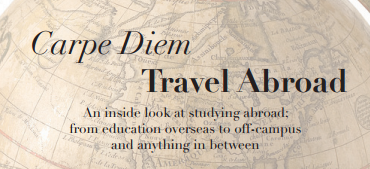Carpe Diem, Study Abroad
Exploring the Big Island

Faculty, students and more than 30 international management majors are packing their bags and preparing to fly 4,826 miles to Ilha Grande, Brazil for the popular Pace Travel Course “Producing the Documentary”.
The group of 42 will discover learning through adventure, as they will be experiencing locations such as the colonial town of Paraty and the city of Rio de Janiero from Mar. 14-24.
“I pick a story first, then location,” media communications and visual arts professor and travel course leader, Dr. Maria Luskay. “There’s a story in Brazil with the upcoming World Cup”
This year, the story will follow the 2014 World Cup. However, the primary focus of the class is to document Brazil’s efforts to limit environmental and social harms as the country braces for a huge influx of sports fans and tourists, lured by the upcoming soccer tournament as well as the 2016 Summer Olympics.
Dr. Luskay’s travel courses have delivered three award winning documentaries, all of which aim to promote awareness about environmental conservation and sustainable resource management. Previous films include”¡Viva La Tortuga!”, “Seeking Sustainability One Shrimp at a Time” and “Battle Behind the Bottle”.
Professor Andrew Revkin, who teaches environmental-science communication and documentary video courses, is also leading the trip and has featured student’s work on his “Dot Earth” blog in The New York Times.
“I want students to know how to produce a real story,” Luskay said. “I want them to know the difference between documentary and reality television. Students are impacted in a variety of ways. Some students have never traveled abroad before; some have never been to Brazil. What’s special about this is that Dyson and Lubin are going together, so you have the creative students and the business student.”
Claudia Green, professor of management and Director of Hospitality and Tourism on the New York City campus, is also traveling to Brazil with her students studying international management. She has spent a lot of time making connections in Brazil so that students can interview government officials, business owners, community activists and locals about their thoughts on Brazil’s preparations.
Students have been researching and contacting potential interviewees through social media in their time leading up to the trip as they have been. They have also created a blog to inform the Pace community about their experience, and have already started piecing together a story.
Theresa Williamson, founder of a Rio de Janiero based non-profit organization, Catalytic Communities, which empowers the city’s informal favela communities, was recently interviewed by the students via Skype. She discussed the relationship between the World Cup and Summer Olympics, the cities they will be held in, and how people in positions of power push their own visions in the name of preparing for the large sporting event.
“In the case of Rio, this involves primarily mass displacement, “ said Williamson, “either through forced evictions, consensual relocations or gentrification”.
These kinds of issues, as well as the World Cup’s impact on the environment, are what students will investigate further during their spring break in Brazil.
Students are encouraged to show their support by liking, following and interacting on this travel course’s blog, Twitter, Facebook and Instagram networks.
“Social Media doesn’t work if you’re not social,” Luskay said.
More information about @pacebrazil2014 and social media links can be found at http://pacebrazil2014.wordpress.com/
Your donation supports independent, student-run journalism at Pace University. Support the Pace Chronicle to help cover publishing costs.
